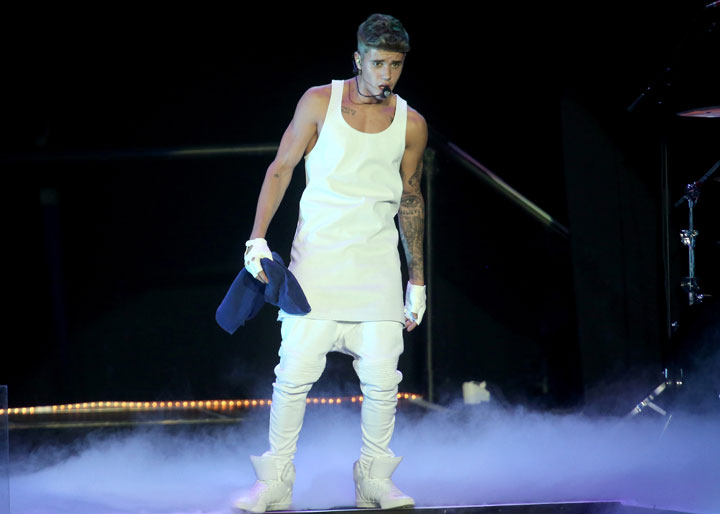TORONTO – Justin Bieber’s brushes with the law north and south of the Canadian border have placed him at risk of being barred from entering the United States, legal experts said.

The 19-year-old Canadian pop star is no stranger to having his public antics take a toll on his career. A string of recent headline-grabbing incidents — including reports of public urination and visits to a South American brothel — has slowly eroded the squeaky-clean image that helped vault him to global stardom before he’d turned 16.
But lawyers said what police described as a drag-racing incident in Florida and an alleged assault in Toronto, both of which resulted in criminal charges, could spell more drastic consequences for the Ontario native.
Add in the positive drug test after the Florida arrest, they said, and Bieber’s immigration status is very much up in the air.
Bieber has pleaded not guilty to the Florida charges, and his lawyer said he is innocent of the allegations in Toronto.
Henry Chang, a Toronto-based immigration lawyer registered in both the U.S. and Canada, said Bieber’s close ties to the States would not offer him much protection from laws that are both complex and vague.
Even if the teen had secured a green card or other residency documents, Chang said, he could still find himself being turned away from the U.S. border next time he tries to cross.
“These rules of inadmissibility apply to green card holders too, so it’s not like it’s going to protect him,” Chang said in a telephone interview. “If he’s a citizen he’s fine, but even a green card holder is subject to removal bars. So he still needs to worry about that.”
READ MORE: Could Justin Bieber be deported if charged, convicted of pelting eggs
Bieber’s admissibility largely hinges on a principle known as moral turpitude, Chang said.
The legal definition of this concept is vague, but the U.S. Board of Immigration Appeals describes such an offence as “an act that is per se morally reprehensible and intrinsically wrong,” he said.
This means the severity of Bieber’s alleged transgressions on either side of the border is largely left up to the discretion of the official processing him at the time, Chang said.
Chang said the charges he’s incurred so far likely won’t cause him immediate problems, since he has not been convicted of any crimes.
Even if convictions came later, the offences fall into a grey area that may allow him to regain entry to the country.
The three charges he racked up last week in Florida wouldn’t sound many alarm bells, Chang said, since driving under the influence, resisting arrest or driving with an expired license are not likely to qualify as crimes of moral turpitude.
Nor, in Chang’s opinion, is the assault charge that Toronto police slapped him with after he turned himself in on Wednesday night. Bieber is accused of being involved in an altercation in a limousine in the early hours of Dec. 30.
Chang said straightforward assault charges aren’t usually treated as crimes of moral turpitude in the U.S., adding even more serious accusations such as aggravated assault or assault causing bodily harm don’t always get people barred from the country.
Chang said he’s more concerned about a toxicology report released in Florida on Thursday, which said Bieber tested positive for marijuana and the anti-anxiety drug Xanax at the time of his arrest.
Chang said those tests alone could make customs officials leery of allowing Bieber into the country to fulfil studio commitments or tour dates, adding a conviction isn’t necessary in such cases.
“When you start getting into drug offences, all the ambiguity disappears,” he said. “Moral turpitude is irrelevant at that point.”
Bieber wasn’t charged with any marijuana offence, but police in Florida said he admitted to smoking marijuana, taking prescription medication and drinking.
Michael Niren, immigration lawyer with Niren and Associates, agreed that the toxicology report may be enough to keep Bieber in Canada.
Niren also highlighted the ambiguous nature of moral turpitude by speculating that the Toronto assault charge could be grounds for inadmissibility if Bieber was convicted.
Either way, he said, the teen’s travel itineraries will have to factor in more time spent fielding questions from immigration officials.
“I think he will have problems. I think he’s going to be sent to secondary inspection, he’s going to be asked a lot of questions, and it’s going to be at the discretion of the officer to say, ‘OK, I’m going to admit you,'” Niren said.
But Niren also offered hope to “Beliebers” south of the border. Customs officials also have the authority to allow Bieber conditional entry known as parole.
Paroled admission to the U.S. usually involves certain conditions for a fixed time period, he said. Professional athletes and musicians have been able to secure such exemptions, but officials usually reserve them for people entering the country on compassionate grounds such as a funeral, he said.
“In (Bieber’s) case, he has a concert to attend to,” Niren said. “Is that a humanitarian reason for admission? I don’t know.”

Comments